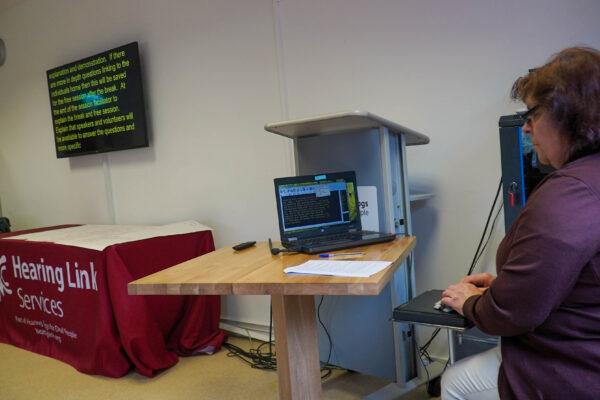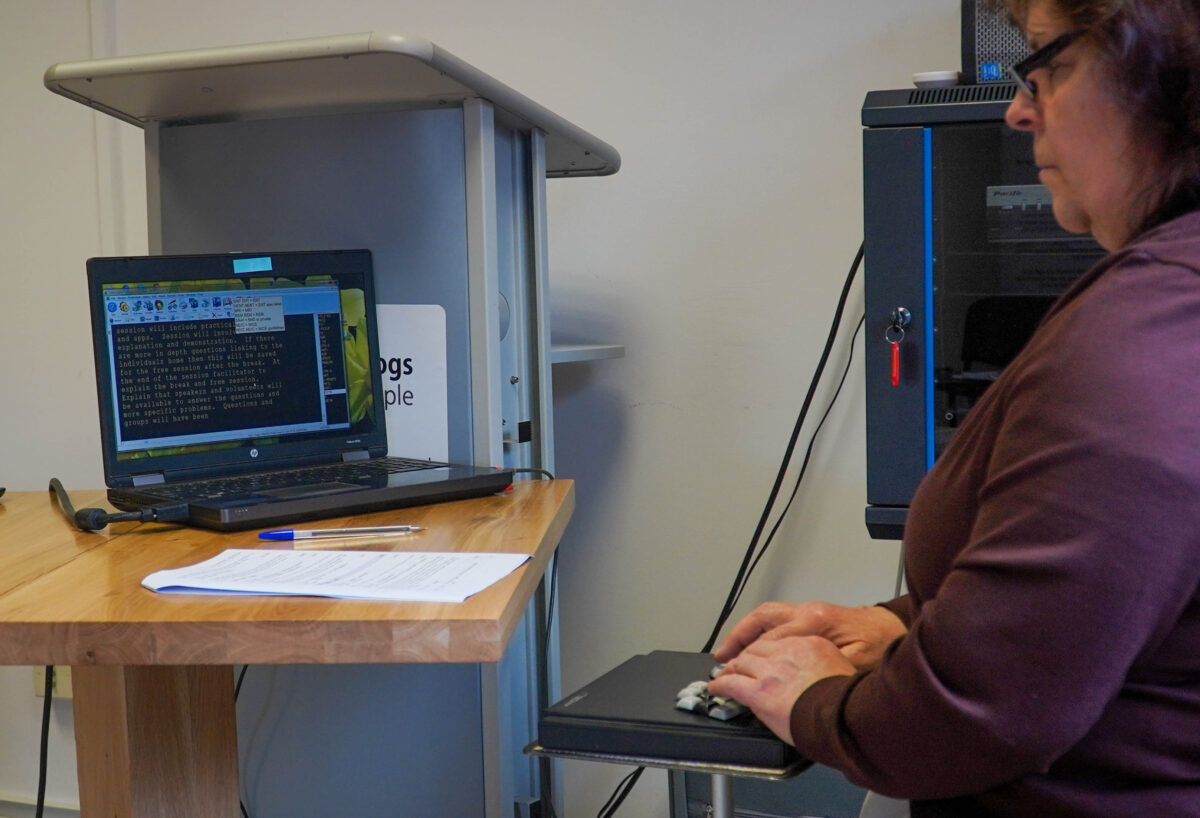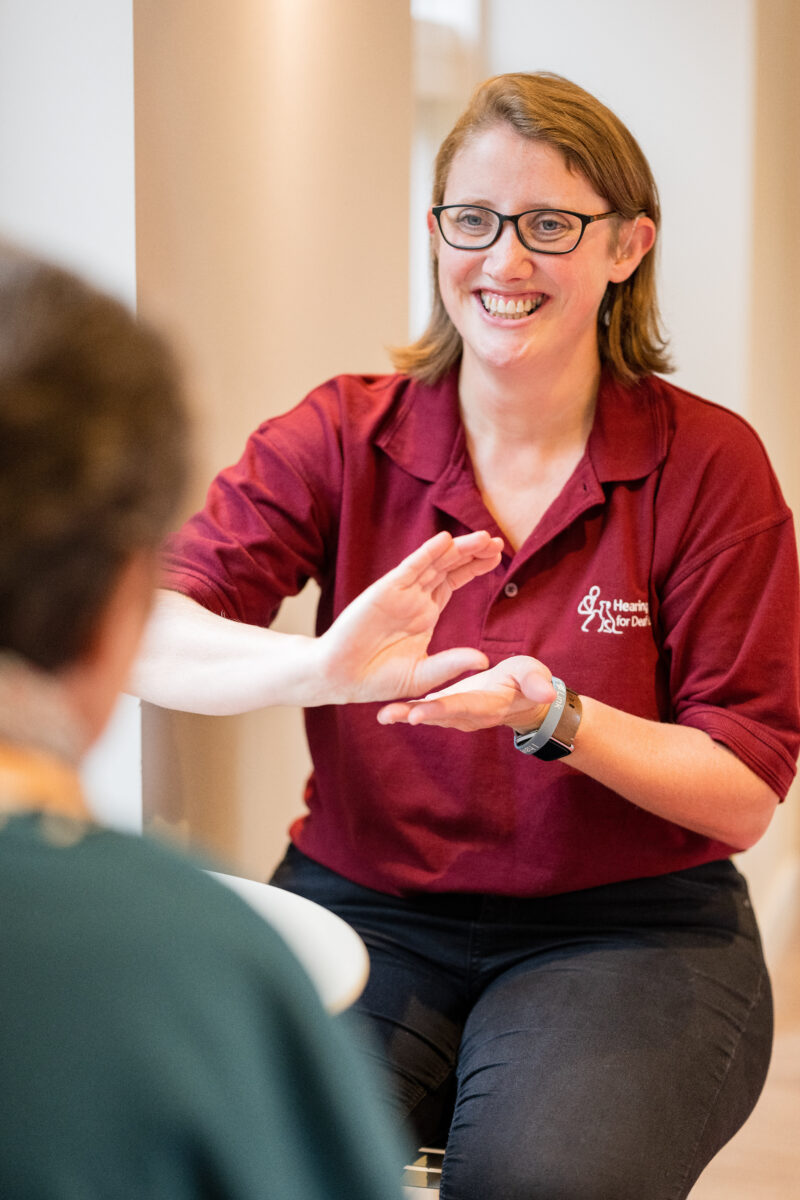Communication support

What is a Communication Professional or Language Service Professional?
Communication support is provided by Communication Professionals (or Language Service Professionals) for hard of hearing, deaf, deafened, Deaf and deafblind people in situations such as a work meeting, job interview, GP consultation, courtroom etc.
The Equality Act 2010 states that people with hearing loss are entitled to equality of access at work, in education and for the purposes of everyday services. This means, for example, that a local authority organising a public meeting should provide some form of communication support.
Access to Work will often fund the services of a Communication Professional in work-related circumstances. Visit this page for more information about Access to Work and communication support in England, Scotland or Wales. Visit this page for more information about Access to Work and communication support in Northern Ireland.
What kinds of Communication Professionals are there?

Verbatim Speech to Text Reporters (STTR – sometimes known as Palantypists or Stenographers)
Using a special phonetic keyboard linked to a laptop computer, Speech-to-Text-Reporters transform the spoken word into writing and display what’s being said on a computer screen or a large screen at the front of the meeting. The STTR works at speed and so the odd imperfection will creep in. They will also include any relevant sounds e.g. laughter, door opening.
You may require more than one STTR per event depending on its duration to allow for eye breaks. In more recent times, technology has advanced so STTR can also be carried out remotely via video calling (e.g. Zoom or Microsoft Teams).
STTRs are regulated by the National Registers of Communication Professionals working with Deaf and Deafblind People. Visit their website for more details or visit the Association of Speech-to-Text Reporters website: avsttr.org.uk
Manual note-takers
Manual notetakers hand write in English a summary of all relevant spoken information in a wide variety of settings. These include, but are not limited to, classrooms or lecture theatres, meetings, medical appointments, work trainings and conferences.
Having a manual notetaker can leave people with hearing loss free to concentrate on what is being said and allows them to refer back to the information that is written down either in the moment or at a later time. Unlike Speech-to-Text Reporters, they do not provide a verbatim account of what is being said, only a summary.
For more information about Manual Notetakers, visit the Association of Notetaking Professionals website: anpnotetakers.co.uk
Electronic note-takers
Electronic notetakers do the same thing a manual notetaker does, but they use a laptop computer. They can often type faster than someone can write using a pen and sometimes the typed version is easier to read than handwriting. Though electronic notetakers do not provide a verbatim record, they do use special note-taking software that helps speed up the typing process. Many times, electronic notetakers have two laptops: one that they type on and a second one connected to the first that the person with hearing loss can read from. In some settings, they can also project what they are typing onto a screen at the front of the room.
When compared to speech-to-text-reporting, electronic notetaking has been described providing ‘all of the meaning, but not all of the words’. This can make it more manageable – and more cost effective – and the digestable notes can be provided to the client after the event.
For more information about what electronic notetakers do and/or to make a booking, visit the Association of Notetaking Professionals website: anpnotetakers.co.uk
Lipspeakers
According to the Association of Lipspeakers, a lipspeaker is ‘a hearing person trained to repeat a speaker’s message to lipreaders accurately, without using their voice‘. They produce clearly the shape of words, the flow, rhythm and phrasing of natural speech and repeat the stress as used by the speaker. The lipspeaker also uses facial expression, natural gesture and fingerspelling (if requested) to aid the lipreader’s understanding. A lipspeaker may be asked to use their voice, using clear communication techniques, thus enabling the lipreader to benefit from any residual hearing.”
Lipspeakers can be used in a wide variety of settings by people who use lipreading as their main method of communicating with others.
For more information about what lipspeakers can do, in what settings they can provide services and/or to find a lipspeaker in your area, you can visit the Association of Lipspeakers website at: lipspeaking.co.uk
Sign Language Interpreters

Sign language interpreters interpret between people who are deaf and use sign language and those who use spoken English. In the UK, British Sign Language (BSL) is used – and therefore BSL interpreters will interpret between BSL and English. (In Northern Ireland, interpreters will use a combination of BSL and Irish Sign Language.) The BSL interpreter will speak what is signed and sign what is spoken to allow full communication between two or more parties. As with the other Language Service Professionals, BSL interpreters can be used in a wide variety of settings, from educational settings to legal settings to medical settings.
The Association of Sign Language Interpreters website (asli.org.uk – or the Scottish Association of Sign Language Interpreters website: sasli.org.uk) provides a way for you to find registered and qualified BSL interpreters in your area.
Deafblind interpreters
When someone has both hearing loss and sight loss, or a dual sensory impairment, they may require the services of a deafblind interpreter. These communication professionals use the deafblind manual alphabet to relay a conversation onto the deafblind person’s hand. Depending on the needs and skills of the deafblind person, Deafblind interpreters may also use the block alphabet or hands-on signing for the personal with the dual sensory loss. For more information on this kind of communication support, you can visit the RNID’s website.
Communication support workers
Communication support workers work in educational settings to support the learning of people with hearing loss. They can work with young people (those under 16) as well as adults (those 16 and older). They work as part of a team with other professionals like teachers, lecturers, audiologists, etc. to ensure that people with hearing loss have equal access to information and education. Communication support workers may use one or more of the communication strategies described above. For more information about what Communication support workers do, you can read their Codes of Practice here: adeptuk.co.uk/CSW_Code_of_Practice.pdf
How to book a Communication Professional
Look on the National Registers of Communication Professionals working with Deaf and Deafblind People or click on one of the links above to find a Communication Professional near you.
Many times, the service provider for which you need a Communication Professional will book the service for you if you request it. However, you can also book a Communication Professional yourself, again, using the links above or by using other organisations, like Action on Hearing Loss, the Royal Association for Deaf People or Deaf Action.
Making the NHS accessible
In August 2016, all NHS and adult social care providers across England became legally required to meet NHS England’s Accessible Information Standard. Its aim is to make sure that all organisations providing NHS or social care make their information accessible for all people in a way they can understand and by providing any communication support they need. This means you should tell your NHS/social care professional:
- If you lipread, use hearing aids, cochlear implants, hearing loop systems or British Sign Language
- What communication support you require for appointments e.g. a lipspeaker, speech-to-text reporter, notetaker, BSL interpreter
- How you wish them to contact you e.g. by telephone, email, SMS/text or Text relay
More information about the Accessible Information Standard can be found here: england.nhs.uk/accessibleinfo/
In June 2017, the Scottish Government published the new “Health and Social Care Standards”. These were to be implemented by April 2018 and they set out what is expected when using health, social care or social work services in Scotland. Most relevant for people with hearing loss is that people should expect access to “translation services and communication tools where necessary” and should be supported to use such services and tools.
You can read more about these standards at the Health and Social Care Standards website: newcarestandards.scot
Webpage updated: August 2024